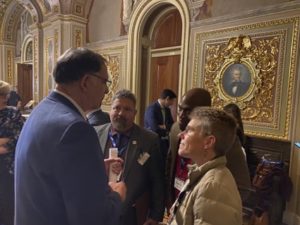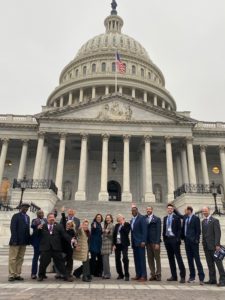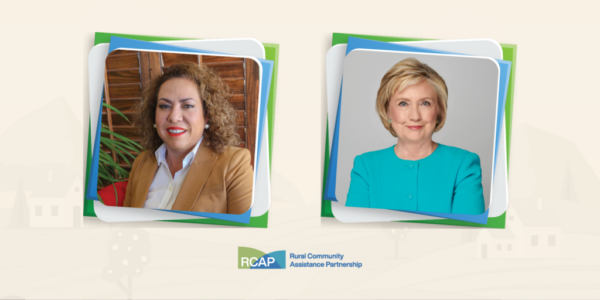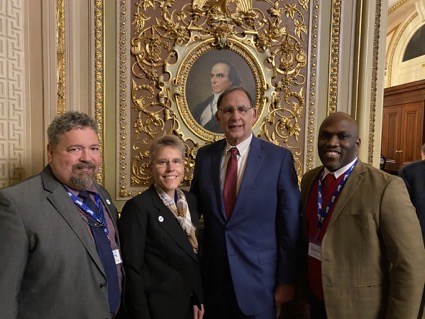A Look Inside RCAP’s Fly-In: Meeting With the Team Behind the Fly-In

From February 27 to March 2, 2023, the Rural Community Assistance Partnership (RCAP) will host our annual Fly-In in Washington D.C. To get an inside perspective on the Fly-In, I sat down with RCAP’s Policy & Advocacy team, which includes some of the folks on the Fly-In planning team. These individuals include Hunter Jackman, Maranda Saling, and Ted Stiger. This will be both Hunter and Maranda’s first in-person Fly-In.
In your own words, what is the RCAP Fly-In?
Maranda: I’m still trying to get ahold of what the Fly-In is, but I believe this is our opportunity for our regions to come together with our National Office staff in D.C. and get an insider view of the advocacy work that we do. Additionally, regional staff gets to spend time with staff on the Hill to build relationships and they can go back home to continue their work.
Hunter: That’s a good summary but I have a few additions. When regional staff members are building relationships with their Members of Congress (MoC) and their offices, they are also talking about the work they’ve done over the past year or so. It’s a chance to showcase their work and bring their work to serve a higher purpose in the sense that the work speaks directly to some of our (RCAP’s) policy priorities. It’s really powerful for MoC to hear the impact and work that’s directly impacting these communities, showing that these programs and funds are being put to good use.
As a follow-up, for those who are not attending the Fly-In. How can they interact with Congress outside of this event?
M: Due to COVID-19, folks can interact with MoC through virtual meetings. Additionally, folks can visit their state offices and build relationships with those who work in those offices. Additionally, regions will get external materials I believe they can use outside of the Fly-In?
H: Correct! Those external materials can be used all year (such as the RCAP one-pager and our policy priorities) and remain valuable. Any skills regional staff members learn during the Fly-In preparatory webinar or experiences they had while reaching out to their MoC to schedule a meeting can easily transfer over to their interactions with their home offices. I think the value goes beyond just this Fly-In.
Ted: I want to jump in and say the National Office advocacy team provides a ton of resources and training to regional staff. We provide services to regions to be able to support their communities and really advocate not only for their organizations but for the communities as well.
Okay, now this is going to be our first in-person Fly-In since 2020. Hunter, I know you have attended Fly-Ins in the past, albeit virtual, and Maranda, this will be your first Fly-In ever. How do you two feel about the preparation that went into the in-person Fly-In? Any differences between the preparation for the virtual? Excited?
M: I’ll start. I’m very excited to be in person since this is my first actual Fly-In. Our prep work has been thorough and very fun, utilizing the relationships we’ve already built.
H: I’m also very excited for it to be hosted in person this year. A lot of the prep work is the same from my end. The logistics of hosting the event are a bit more complicated in-person than in Zoom. In terms of relationship building, having these briefings in person humanizes this work a bit more. It feels more powerful than hosting it over Zoom because there are human beings you tune in and listen to. We’ll see benefits from hosting our briefings and plenaries in person.
T: This is my 13th year in a row doing Fly-Ins and advocacy days, so I think over the years I’ve picked up some tips of the trade and that we’re really offering cutting-edge Fly-In advocacy for the network. I prefer in-person over virtual any day, but at least Capitol Hill has changed the culture where we can have meetings and not have to go to Washington D.C. Being in person is great for relationship building, but flying to Washington D.C. was always an access issue. Having a virtual option helps widen our impact, but we have to be cognizant of those who live in rural and don’t have the bandwidth strength to reach out to their MoC. We’re excited about both in-person and virtual options and want to make sure everyone is prepared for both options.

Lastly, are there any big things coming up for the Fly-In this year that people should be on the lookout for?
T: We have Radikha Fox who runs the EPA office of water. We have a lineup of speakers who are key decision-makers in Washington. We have Mitch Landrieu, who Biden appointed to oversee the entire Bipartisan Infrastructure Law, which is almost $1t in investments. We also have Senator Boozman coming to accept his congressional award and we are giving an award to Senator Brown as well. We support MoCs who are interested in getting things done and are problem-solvers.
H: Something I’m particularly excited about this Fly-In is that this is the first time we’ll be having Community Economic Development (CED) programming at a Fly-In. Right, Ted?
T: Yes, this will be the first congressional briefing that we’ve done on community economic development policy at a Fly-In.
H: One point of clarification is this will be the first time we’ve had a CED briefing at a Fly-In, but we had a briefing back in June of 2022, that was separate from the Fly-In. These briefings occur to further RCAP’s CED policy work in Washington D.C. and beyond. We want to continue furthering our advocacy efforts around community and economic development issues when possible.
Anything else? Maranda?
M: I’m pretty excited about presenting the Congressional Awards and meeting one of the Senators!
Yeah, those are pretty fun. That covers all the questions for today. I appreciate you all taking the time to chat with me about this year’s Fly-In.
Learn more about the Fly-In here and follow along on Twitter with the hashtag #RCAPOnTheHill2023


